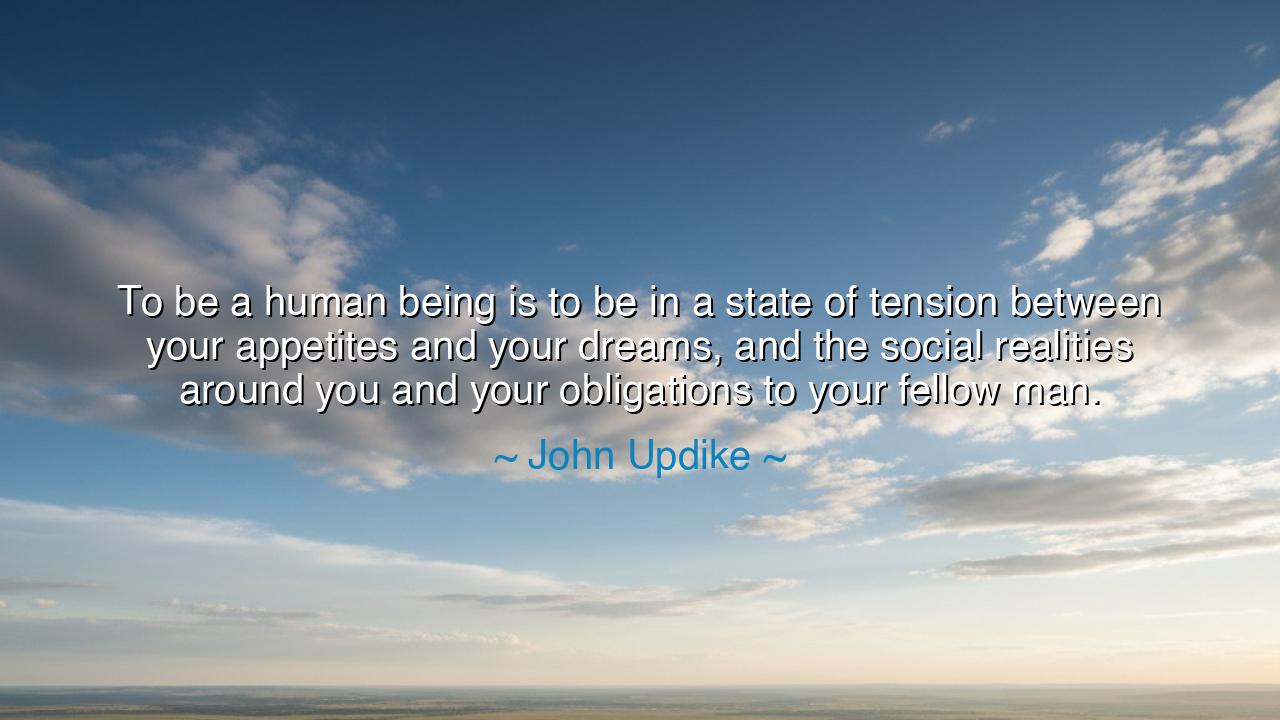
To be a human being is to be in a state of tension between your
To be a human being is to be in a state of tension between your appetites and your dreams, and the social realities around you and your obligations to your fellow man.






In the poignant words of John Updike, "To be a human being is to be in a state of tension between your appetites and your dreams, and the social realities around you and your obligations to your fellow man," we are reminded of the eternal struggle within each of us—the delicate balance between desire, ambition, and responsibility. Updike’s reflection speaks to the heart of human existence: we are creatures of passion and aspiration, driven by our own inner longings and dreams, yet bound by the social contracts and responsibilities that tether us to the world around us. This tension is not a weakness, but a defining characteristic of what it means to be human—a constant pull between what we want and what the world demands of us.
The ancient philosophers often grappled with this very struggle, as they considered the nature of human life and the moral obligations that come with it. In Plato’s Republic, he presents the idea of the ideal state, where the individual must seek harmony between the desires of the soul—represented by the appetites—and the higher pursuit of truth and wisdom. Similarly, Aristotle believed in the importance of achieving balance between the desires of the flesh and the needs of the greater good. For both thinkers, human beings are not mere creatures of instinct, but complex beings whose dreams and obligations must be carefully weighed and harmonized to live a life of virtue.
Consider the story of Socrates, who lived his life in constant tension between his own philosophical dreams—his quest for truth—and his social obligations. As a philosopher, Socrates was dedicated to challenging the conventional beliefs of Athens, urging others to question the social norms and to seek wisdom above all. Yet, this pursuit often placed him at odds with the prevailing social realities. His commitment to truth and virtue led him to question authority and convention, ultimately costing him his life when he was sentenced to death for corrupting the youth of Athens. Socrates' fate serves as a testament to the tension between individual aspirations and the demands of society, as he chose to remain true to his dreams and beliefs, even in the face of great personal sacrifice.
This tension between appetites and dreams, and the conflicting demands of society, is a universal experience. The modern world often exacerbates this conflict, as we are bombarded with desires—material, social, and personal—that can seem at odds with the ideals of duty and obligation. Updike himself, writing in a time of materialism and consumerism, understood the pressure that society places on individuals to satisfy their appetites, often at the expense of their higher goals and dreams. His words remind us that this struggle is not new, but a constant challenge throughout history. Whether in ancient times or today, we are called to navigate the delicate line between our personal dreams and the social demands that shape our actions.
Yet, the lesson of Updike’s quote is not merely about the conflict itself, but about how we choose to engage with it. To be human is to be aware of this tension, and in that awareness, we find our freedom. The tension between our appetites and dreams, between personal desires and social responsibility, is not something to be avoided but something to be embraced. The act of living fully is about finding ways to align our internal aspirations with the external demands of society, creating a balance that allows us to fulfill our duties while also pursuing our higher goals. It is in this balance that we discover the true essence of humanity.
An example from history that reflects this balance is Nelson Mandela. Mandela spent much of his life torn between his dream of a free and just South Africa and his obligations to his people and his cause. While imprisoned for his beliefs, he could have been consumed by resentment and despair, overwhelmed by the appetites for vengeance and bitterness. Yet, Mandela chose to reconcile these tensions, using his personal suffering to fuel his dreams for a better future. When he became president, he united the nation not just through political means but through his ability to balance personal sacrifice with social responsibility, embodying the true power of human dignity and the ability to live out dreams in the face of overwhelming odds.
The practical action we can take is to acknowledge the tension in our own lives between our personal dreams and the demands placed on us by society. We must learn to navigate this tension not by denying our desires or aspirations but by integrating them into the realities of the world. By doing so, we can live with purpose, understanding that our responsibilities to others are not a hindrance to our personal growth, but rather an essential part of realizing our dreams. Let us, like Socrates, Mandela, and others who have come before us, embrace this tension and find in it the energy to create lives that are meaningful, fulfilled, and truly human.






AAdministratorAdministrator
Welcome, honored guests. Please leave a comment, we will respond soon